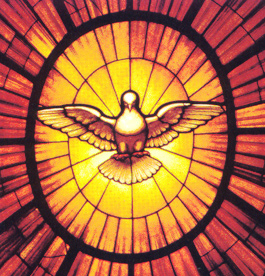Holy Spirit in Christianity
Holy Spirit in Christianity
The Holy Spirit is a central figure in Christianity, representing the third person of the Trinity, alongside God the Father and Jesus Christ, the Son. The concept of the Holy Spirit has evolved over centuries, embodying the presence of God in the world and playing a crucial role in the theology, liturgy, and spiritual life of Christian believers. This article explores the theological significance, scriptural basis, and historical development of the Holy Spirit within Christianity.
Theological Significance[edit | edit source]
In Christian theology, the Holy Spirit is considered both divine and personal, actively involved in the creation, redemption, and sanctification of the believer. The Holy Spirit's roles include convicting individuals of sin, guiding them to truth, and empowering them for service and holy living. The presence of the Holy Spirit is also seen as a guarantee of the believer's relationship with Christ, often symbolized by the acts of baptism and Confirmation in many Christian traditions.
Scriptural Basis[edit | edit source]
The Holy Spirit is mentioned throughout the Bible, with its roles and attributes elaborated in both the Old Testament and the New Testament. In the Old Testament, the Spirit of God is seen in the creation narrative (Genesis 1:2) and in empowering individuals for specific tasks (e.g., Bezalel in Exodus 31:3). The New Testament significantly expands on the Holy Spirit's role, particularly in the Gospels, where Jesus promises the Spirit as a helper and advocate (John 14:16-17), and in the Acts of the Apostles, which describes the Pentecost event as the outpouring of the Holy Spirit on the early church (Acts 2).
Historical Development[edit | edit source]
The understanding and interpretation of the Holy Spirit have developed over the centuries, influenced by theological debates and ecumenical councils. Early church fathers, such as Augustine of Hippo and Basil the Great, contributed significantly to the doctrine of the Trinity and the Holy Spirit's place within it. The Filioque controversy, a dispute over the Holy Spirit's procession from the Father and/or the Son, highlighted the complexities of Trinitarian theology and led to significant ecclesiastical divisions between the Eastern Orthodox and Western Christian churches.
Symbols of the Holy Spirit[edit | edit source]
The Holy Spirit is represented by several symbols in Christian tradition, each reflecting different aspects of its nature and work. Common symbols include the dove, representing peace and purity; fire, symbolizing purification and the empowering presence of God; and water, denoting life, cleansing, and renewal. The anointing with oil is another symbol associated with the Holy Spirit, signifying consecration and the impartation of the Spirit's gifts.
Contemporary Perspectives[edit | edit source]
Contemporary Christian thought continues to explore and debate the nature, role, and activities of the Holy Spirit. Charismatic and Pentecostal movements emphasize the experiential aspects of the Holy Spirit, including the gifts of prophecy, healing, and speaking in tongues. In contrast, other traditions focus on the Spirit's role in personal sanctification and community life, highlighting the fruits of the Spirit as evidence of the Spirit's presence in the believer's life.
Conclusion[edit | edit source]
The Holy Spirit remains a profound and vital aspect of Christian faith and practice, embodying the presence and power of God in the world. Its role in guiding, empowering, and sanctifying believers underscores the dynamic and relational nature of Christian theology and spirituality.
This article is a Christianity-related stub. You can help WikiMD by expanding it!
Search WikiMD
Ad.Tired of being Overweight? Try W8MD's physician weight loss program.
Semaglutide (Ozempic / Wegovy and Tirzepatide (Mounjaro / Zepbound) available.
Advertise on WikiMD
|
WikiMD's Wellness Encyclopedia |
| Let Food Be Thy Medicine Medicine Thy Food - Hippocrates |
Translate this page: - East Asian
中文,
日本,
한국어,
South Asian
हिन्दी,
தமிழ்,
తెలుగు,
Urdu,
ಕನ್ನಡ,
Southeast Asian
Indonesian,
Vietnamese,
Thai,
မြန်မာဘာသာ,
বাংলা
European
español,
Deutsch,
français,
Greek,
português do Brasil,
polski,
română,
русский,
Nederlands,
norsk,
svenska,
suomi,
Italian
Middle Eastern & African
عربى,
Turkish,
Persian,
Hebrew,
Afrikaans,
isiZulu,
Kiswahili,
Other
Bulgarian,
Hungarian,
Czech,
Swedish,
മലയാളം,
मराठी,
ਪੰਜਾਬੀ,
ગુજરાતી,
Portuguese,
Ukrainian
Medical Disclaimer: WikiMD is not a substitute for professional medical advice. The information on WikiMD is provided as an information resource only, may be incorrect, outdated or misleading, and is not to be used or relied on for any diagnostic or treatment purposes. Please consult your health care provider before making any healthcare decisions or for guidance about a specific medical condition. WikiMD expressly disclaims responsibility, and shall have no liability, for any damages, loss, injury, or liability whatsoever suffered as a result of your reliance on the information contained in this site. By visiting this site you agree to the foregoing terms and conditions, which may from time to time be changed or supplemented by WikiMD. If you do not agree to the foregoing terms and conditions, you should not enter or use this site. See full disclaimer.
Credits:Most images are courtesy of Wikimedia commons, and templates, categories Wikipedia, licensed under CC BY SA or similar.
Contributors: Prab R. Tumpati, MD





